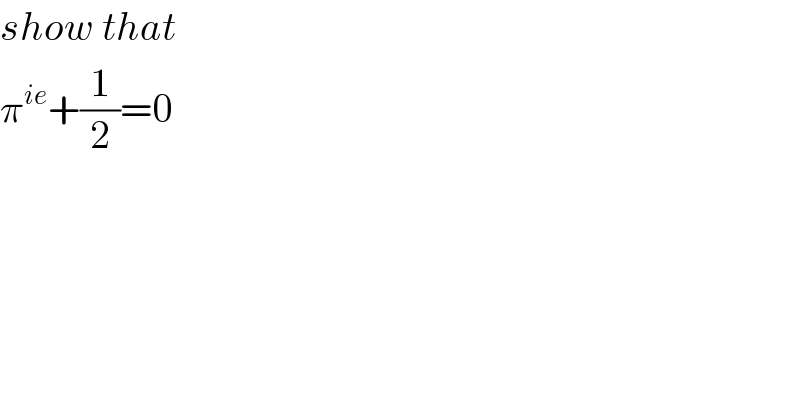
Question Number 82041 by M±th+et£s last updated on 17/Feb/20

$${show}\:{that} \\ $$$$\pi^{{ie}} +\frac{\mathrm{1}}{\mathrm{2}}=\mathrm{0} \\ $$
Commented by mr W last updated on 17/Feb/20

$${certainly}\:{it}'{s}\:{not}\:{your}\:{fault}\:{that}\:{it}\:{is} \\ $$$${not}\:{equal}\:{to}\:{zero}.\:\:{it}\:{is}\:{so},\:{nobody}\:{is} \\ $$$${to}\:{blame}\:{for}\:{it}.\: \\ $$
Commented by mr W last updated on 17/Feb/20

$$\pi^{{ie}} +\frac{\mathrm{1}}{\mathrm{2}}={e}^{{i}\left({e}\mathrm{ln}\:\pi\right)} +\frac{\mathrm{1}}{\mathrm{2}}=\mathrm{cos}\:\left({e}\mathrm{ln}\:\pi\right)+\frac{\mathrm{1}}{\mathrm{2}}+{i}\:\mathrm{sin}\:\left({e}\mathrm{ln}\:\pi\right) \\ $$$$\approx−\mathrm{0}.\mathrm{499553}+\mathrm{0}.\mathrm{029890}{i}\:\neq\mathrm{0} \\ $$
Commented by mr W last updated on 17/Feb/20

$${something}\:{is}\:{wrong}\:{with}\:{the}\:{question}. \\ $$
Commented by M±th+et£s last updated on 17/Feb/20

$${thanks}\:{for}\:{all}\:{about}\:{the}\:{solutiond}\:{and}\:{iam} \\ $$$${so}\:{sorry}\:{its}\:{my}\:{fault}\:{it}\:{doesn}'{t}\:{equal}\:{zero} \\ $$$$ \\ $$
Answered by MJS last updated on 17/Feb/20
![a^(ib) = [a>0] =cos (bln a) +i sin (bln a) { (((1/2)+cos (bln a) =0)),((sin (bln a) =0)) :} { ((bln a =2k_1 π±((2π)/3); k_1 ∈Z)),((bln a =k_2 π; k_2 ∈Z)) :} ⇒ k_2 =2k_1 ±(2/3) ⇒ k_1 ∈Z xor k_2 ∈Z ⇒ no solution ⇒ ∀a∈R^+ ∀b∈R: a^(ib) +(1/2)≠0 z=cos (bln a) +i sin (bln a) ⇒ abs z =1∧arg z =bln a ⇒ π^(ie) =e^(ie ln π) ≈−.999553+.0298898i ⇒ π^(ie) +(1/2)≠0](Q82049.png)
$${a}^{\mathrm{i}{b}} = \\ $$$$\:\:\:\:\:\left[{a}>\mathrm{0}\right] \\ $$$$=\mathrm{cos}\:\left({b}\mathrm{ln}\:{a}\right)\:+\mathrm{i}\:\mathrm{sin}\:\left({b}\mathrm{ln}\:{a}\right) \\ $$$$\begin{cases}{\frac{\mathrm{1}}{\mathrm{2}}+\mathrm{cos}\:\left({b}\mathrm{ln}\:{a}\right)\:=\mathrm{0}}\\{\mathrm{sin}\:\left({b}\mathrm{ln}\:{a}\right)\:=\mathrm{0}}\end{cases} \\ $$$$\begin{cases}{{b}\mathrm{ln}\:{a}\:=\mathrm{2}{k}_{\mathrm{1}} \pi\pm\frac{\mathrm{2}\pi}{\mathrm{3}};\:{k}_{\mathrm{1}} \in\mathbb{Z}}\\{{b}\mathrm{ln}\:{a}\:={k}_{\mathrm{2}} \pi;\:{k}_{\mathrm{2}} \in\mathbb{Z}}\end{cases} \\ $$$$\Rightarrow\:{k}_{\mathrm{2}} =\mathrm{2}{k}_{\mathrm{1}} \pm\frac{\mathrm{2}}{\mathrm{3}}\:\Rightarrow\:{k}_{\mathrm{1}} \in\mathbb{Z}\:\mathrm{xor}\:{k}_{\mathrm{2}} \in\mathbb{Z}\:\Rightarrow\:\mathrm{no}\:\mathrm{solution} \\ $$$$\Rightarrow\:\forall{a}\in\mathbb{R}^{+} \forall{b}\in\mathbb{R}:\:{a}^{\mathrm{i}{b}} +\frac{\mathrm{1}}{\mathrm{2}}\neq\mathrm{0} \\ $$$$ \\ $$$${z}=\mathrm{cos}\:\left({b}\mathrm{ln}\:{a}\right)\:+\mathrm{i}\:\mathrm{sin}\:\left({b}\mathrm{ln}\:{a}\right) \\ $$$$\Rightarrow\:\mathrm{abs}\:{z}\:=\mathrm{1}\wedge\mathrm{arg}\:{z}\:={b}\mathrm{ln}\:{a} \\ $$$$\Rightarrow\:\pi^{\mathrm{ie}} =\mathrm{e}^{\mathrm{ie}\:\mathrm{ln}\:\pi} \approx−.\mathrm{999553}+.\mathrm{0298898i} \\ $$$$\Rightarrow\:\pi^{\mathrm{ie}} +\frac{\mathrm{1}}{\mathrm{2}}\neq\mathrm{0} \\ $$
